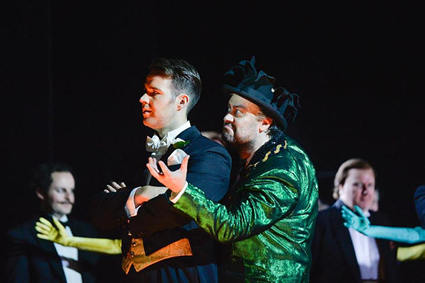| Opera Reviews | 26 April 2024 |
A Rigoletto revival that resonates with today's audienceby Catriona Graham |
|
| Verdi: Rigoletto
Scottish Opera November 2018 |
|

Adam Smith (Duke of Mantua), Aris Argiris (Rigoletto), Chorus
|
|
|
It is interesting seeing Scottish Opera’s revival of Rigoletto; so much has happened in the intervening seven years. Director Matthew Richardson was very prescient, developing something with so much resonance today. Was the notorious Presidents’ Club Dinner only back in January? Yet, in the background of the Duke’s boasting of conquests, his male guests dance with identically-dressed mannequins, and doors open to reveal sexual harassment verging on assault. Rigoletto, the Duke’s court jester, is complicit in this, making jokes though, as the Duke says, his jokes go too far. When Count Monterone arrives, to avenge the seduction of his daughter, he is mocked by Rigoletto. In turn, the Count curses him; Rigoletto may try to laugh it off in public, but it unsettles him. Aris Argiris first appears during the overture, leaving home in a raincoat and hat. Before our eyes, he puts on the motley and invites us in as voyeurs of the Duke’s party. There’s a husky quality to his voice which accentuates the world-weariness of a man condemned to play the fool because of his deformity. But the man has dignity, and hides all this from his teenage daughter, Gilda. There’s a question about her past - she has only been in the city for three months – and Rigoletto thinks he had hidden her well from the men about court. He hasn’t; they think she is his mistress and abduct her with her father’s inadvertent help. Not, however, before she has confessed to her duenna that she loves a handsome hunk she has seen at church (her only outing). He gets into the house and plies her with some of the corniest chat-up lines on record. She is, after all, only a teenager and, after he has left, ecstatically sings of her love. Caro nome is delightful, and Lina Johnson, in brown pinafore dress, white ankles socks and Mary Jane shoes, could not be more convincing in her portrayal of first teenage love. As she ends, the men of court, in masks look through the window and, having found her, abduct her. Rigoletto, discovering her absence, goes to court where his suspicions are aroused; the men have delivered Gilda to the Duke, who we had previously seen in a room littered with dismembered mannequins, making love to a mannequin torso. Gilda emerges from the room, ravished, and Rigoletto, conscious of the curse, vows revenge. He had earlier encountered contract-killer Sparafucile – David Shipley with sinisterly low notes – and engages him to kill the Duke (unidentified as such). The Duke (Adam Smith) arrives at Sparafucile’s house to see his sister – he’s dressed as an officer, complete with cap and sword. Sioned Gwen Davies in a red dress and wig has heard all the Duke’s chat-up lines before, but plays along because he’s good-looking and charming. Like peeping toms, Rigoletto and Gilda watch as the Duke sings La donna è mobile and breaks Gilda’s heart at the ‘betrayal’. Maddalena persuades Sparafucile to spare the handsome young man and suggests killing Rigoletto instead. Even contract-killers have standards and, instead they agree to kill the first person to come to the door. Gilda has been eavesdropping, and decides to sacrifice herself for the Duke, because she loves him. Rigoletto takes delivery of a body in a sack, hears the Duke reprising La donna è mobile in the distance and discovers the awful truth. His dawning realisation of his loss and his ‘conversation’ with his dead daughter is harrowing. The men's chorus is, frankly, evil and extremely well-drilled. The orchestral playing of Verdi’s score is sharp and conductor Rumon Gamba keeps all moving along smartly.
|
|
| Text © Catriona Graham Photo © Julie Howden |
|







